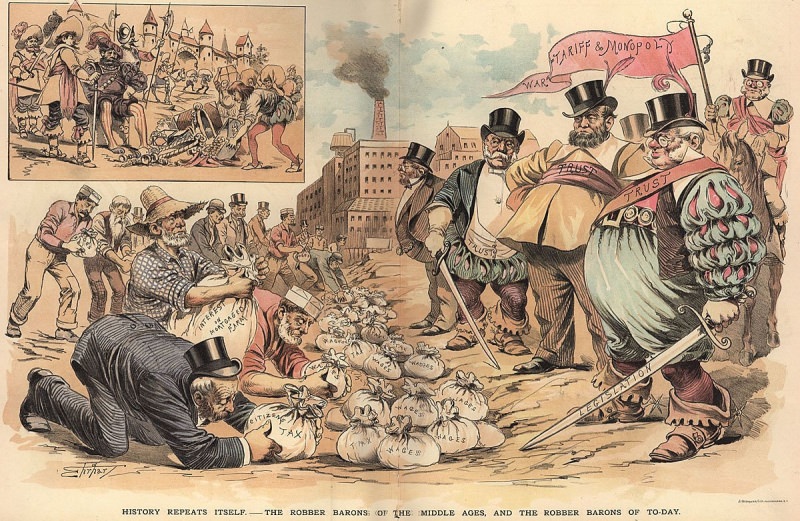В США офицально констатировали смерть демократии, такие выводы сделал авторитетный Принстонский университет.
Princeton Study: U.S. No Longer An Actual Democracy

AP Photo / Patrick Semansky
A new study from Princeton spells bad news for American democracy—namely, that it no longer exists.
Asking "[w]ho really rules?" researchers Martin Gilens and Benjamin I. Page argue that over the past few decades America's political system has slowly transformed from a democracy into an oligarchy, where wealthy elites wield most power.
Using data drawn from over 1,800 different policy initiatives from 1981 to 2002, the two conclude that rich, well-connected individuals on the political scene now steer the direction of the country, regardless of or even against the will of the majority of voters.
TPM Interview: Scholar Behind Viral 'Oligarchy' Study Tells You What It Means
"The central point that emerges from our research is that economic elites and organized groups representing business interests have substantial independent impacts on U.S. government policy," they write, "while mass-based interest groups and average citizens have little or no independent influence."
As one illustration, Gilens and Page compare the political preferences of Americans at the 50th income percentile to preferences of Americans at the 90th percentile as well as major lobbying or business groups. They find that the government—whether Republican or Democratic—more often follows the preferences of the latter group rather than the first.
The researches note that this is not a new development caused by, say, recent Supreme Court decisions allowing more money in politics, such as Citizens United or this month's ruling onMcCutcheon v. FEC. As the data stretching back to the 1980s suggests, this has been a long term trend, and is therefore harder for most people to perceive, let alone reverse.
"Ordinary citizens," they write, "might often be observed to 'win' (that is, to get their preferred policy outcomes) even if they had no independent effect whatsoever on policy making, if elites (with whom they often agree) actually prevail."

Пользуясь источниками более 1 800 политических инициатив за последние 20 лет, исследователи Мартин Джиленс и Бенджамин Пейдж пришли к выводу что всем управляют капиталисты.
А США стала олигархией
Martin Gilens and Benjamin I. Page
Abstract
Each of four theoretical traditions in the study of American politics—which can be characterized as theories of Majoritarian Electoral Democracy, Economic-Elite Domination, and two types of interest-group pluralism, Majoritarian Pluralism and Biased Pluralism—offers different predictions about which sets of actors have how much influence over public policy: average citizens; economic elites; and organized interest groups, mass-based or business-oriented.
A great deal of empirical research speaks to the policy influence of one or another set of actors, but until recently it has not been possible to test these contrasting theoretical predictions against each other within a single statistical model. We report on an effort to do so, using a unique data set that includes measures of the key variables for 1,779 policy issues.
Multivariate analysis indicates that economic elites and organized groups representing business interests have substantial independent impacts on U.S. government policy, while average citizens and mass-based interest groups have little or no independent influence. The results provide substantial support for theories of Economic-Elite Domination and for theories of Biased Pluralism, but not for theories of Majoritarian Electoral Democracy or Majoritarian Pluralism.
Martin Gilens is Professor of Politics at Princeton University (mgilens@princeton.edu). His research examines representation, public opinion, and mass media, especially in relation to inequality and public policy. Professor Gilens is the author of Affluence & Influence: Economic Inequality and Political Power in America (2012, Princeton University Press). Benjamin I. Page is Gordon S. Fulcher Professor of Decision Making at Northwestern University (b-page@northwestern.edu). His research interests include public opinion, policy making, the mass media, and U.S. foreign policy. He is currently engaged in a large collaborative project to study Economically Successful Americans and the Common Good. For helpful comments the authors are indebted to Larry Bartels and Jeff Isaac, to the anonymous reviewers from Perspectives on Politics, and to seminar participants at Harvard University and the University of Rochester.
Доктор Джон Кобб так характеризует положение вещей
«Влияние денег было резко усилено появлением частного банкинга. Банки могут создавать деньги и, значит, давать взаймы суммы, намного превосходящие их реальное богатство. Такой контроль за созданием денег… дал банкам подавляющий контроль над человеческими делами. В США Уолл-Стрит принимает большую часть важных решений, которые напрямую относятся к компетенции Вашингтона».
«Во-первых, участие в выборах на пост стало дорогостоящим, так что тем, кто хотел быть избран, необходимы были богатые спонсоры, кому они и были верны. Во-вторых, огромное большинство избирателей мало что знали из независимых источников о тех, за кого они голосовали, или проблемах, с которыми надо работать.
Их суждения, соответственно, зависели от того, что они узнали в СМИ. В свою очередь, эти СМИ контролировались финансовыми кругами».
«Сегодняшняя экономика всецело транснациональна. Финансовая элита не слишком заинтересована в границах между государствами и в целом работает на снижение их влияния на рынки и инвестиции. …
Таким образом, транснациональные корпорации, по сути, работают на подрыв национальных государств, будь они демократические или нет».
Доктор Алперовиц – соучредитель инициативы под названием «Проект следующего века», направленной на проблемы дебатов по национальной политике в качестве первого шага по реализации возможного. Он цитирует профессора Дональда Ливингстона, который в 2002-м спрашивал:
«Какова ценность продолжения поддержки союза такой чудовищной величины? … существуют достаточные ресурсы американских федеральных традиций обосновать прежний суверенитет штатов и местных сообществ, власть, которую они позволили узурпировать центральному правительству».











Комментарии
Комментарий удален модератором
Как говорил Козьма Прутков - Смотри в корень!